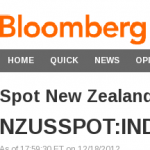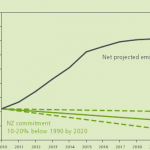
In which I guest-post as myself and describe a carbon forest sink project I am involved in and our debate about whether we should provide carbon offsets to anyone as part of the project. I originally wrote this for the Greens Frogblog
Simon Johnson is a conservationist, tramper, accountant, former DOC worker and resource management consultant. Simon also blogs periodically at Hot-Topic.co.nz. In this guest post he writes about carbon offsetting from the point of view of a carbon forest.
I am one of the trustees of a small 47-hectare carbon forest sink and native re-vegetation project and mountain bike park; “Project Rameka” in the east Takaka hills in Golden Bay.
It’s really a response to climate change made by two of my old friends, Bronwen Wall and Jonathan Kennett, who bought the land in 2008. Bronwen and Jonathan decided to apply their experience organising native planting projects in Wellington to climate change after reading the 2007 fourth report of the International Panel on Climate Change (IPCC).
It’s been embraced enthusiastically by the Golden Bay community who do the planting, pest control and track work through Project Rameka Inc.
The land is owned by a trust and I am one of the trustees. I did the early accounting for the trust and prepared the application to get the land into the Permanent Forest Sinks Iniative (PFSI).
In return for a 50-year covenant restricting the land use to forest, we receive about 800 carbon credits (specifically assigned amount units) per year for Project Rameka. These units started life as part of New Zealand’s 1990 baseline amount of ‘Kyoto’ units under the Kyoto Protocol.
How many units we get is based on the amount of carbon withdrawn from the atmosphere by the trees. Thanks to the Golden Bay weather, plants grow really quickly. So we really are storing carbon. We have seen 3cm annual growth rings in the few pines we have removed.
Continue reading “Carbon offsets from a permanent forest sink project – keep it real”





You must be logged in to post a comment.